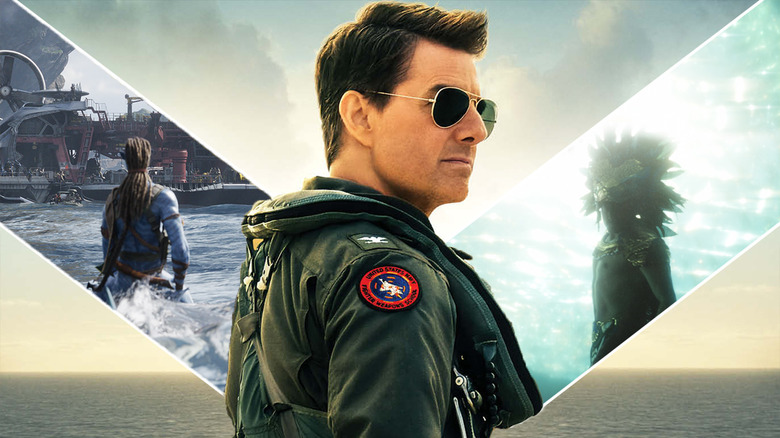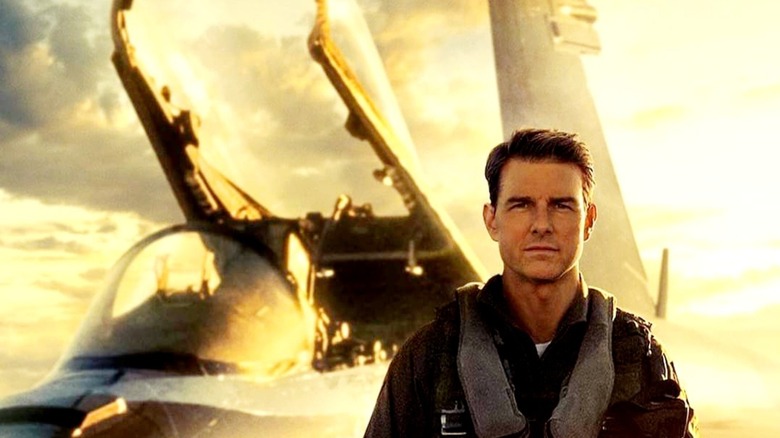How 2023 Became The Year Of The Oscar Blockbusters
This year's Academy Award nominations for Best Picture features a slew of blockbusters alongside the expected Oscar titles, including "Top Gun: Maverick" and "Avatar: The Way of Water." So what does it mean for the genre?
Every year, we wait for the Oscar nominations, and every year, we have the same conversations about it. We wonder why certain films get celebrated over others, and we fight about the snubs, surprises, and total stinkers. For the past decade or so, we've also pondered why blockbuster titles are almost entirely shut out of consideration. How is it that the most viewed films, which are sometimes some of the most acclaimed works of any given year, are mostly dismissed out of the gate from awards season greatness? Even when these films receive a much-desired nomination, such as in the cases of "Mad Max: Fury Road" or "Dune," there's a general understanding that they won't ever win the top prize of Best Picture.
Blockbusters are dominant among the 2023 nominees
This year, however, the blockbuster has made its mark on the nominations for the 95th Oscars. Three of the biggest films of 2022 are front and center alongside the historical dramas, war films, and musical biopics. "Black Panther: Wakanda Forever" follows in the footsteps of its predecessor's Oscar success with five nominations, including one for Best Supporting Actress for Angela Bassett. James Cameron's "Avatar: The Way of Water" got four noms, including one for Best Picture. "Top Gun: Maverick," the long-awaited sequel to the Tom Cruise action favorite, earned six nominations, including Best Picture and Best Adapted Screenplay. It has more nods than expected awards titles like "Babylon" and "Women Talking."
This trio of films has a combined worldwide box office gross of around $4.3 billion. "The Way of Water" is already the fourth highest-grossing film of all time as of the writing of this piece (which means James Cameron can lay claim to directing 60% of the top five, thanks to both "Avatar" movies and "Titanic"). All three movies received strong reviews, with "Maverick" being one of the most acclaimed titles of 2022. Oscar success would merely be an extra dollop of icing on an already well-decorated cake, but it is notable how they're all considered worthy nominees without much grumbling from even the most hardened of skeptics.
How Top Gun, Avatar, and Black Panther became Oscar favorites
Based purely on critical reception, this trio of blockbusters soared above its competition. Expectations were high for all, but few could have predicted seeing "Top Gun: Maverick" landing a 96% score on Rotten Tomatoes. It helped that they made tons of money, of course, but the real clout in regard to the Academy is their images as works of both populist and artistic value. It's tough to deny that "Top Gun: Maverick," for instance, is one of the most technically ambitious works of 2022, a high-concept action tale featuring real fighter pilot stunts and kinetic set-pieces that got butts in seats at the multiplex at a time when studios struggled to do so. James Cameron somehow topped his own lavish expectations with "The Way of Water" when it came to advancements in CGI and the movie's underwater scenes. "Wakanda Forever" saw Ryan Coogler and his team face the impossible circumstances created by the death of Chadwick Boseman and create a heartfelt meta story of grief and heroism that gave Bassett a showcase for one of her best performances in years.
It's not uncommon for this type of film to receive some sort of Oscar recognition. We see them pop up frequently in tech categories since full-force CGI and sound design are at their most prominent in such works. Yet breaking into the big categories, including Best Picture, Best Director, and the acting categories isn't so easy. For "Maverick" to be recognized for its screenplay speaks to the tight plotting and clockwork-precise nature of its narrative, something many franchise films struggle with (there's no third act stumble here). Bassett's Best Supporting Actress nom is a first for Marvel Studios, which is a major breakthrough for the company, and she's currently a frontrunner to win it.
These aren't seen as regular blockbusters
Key to their success is the sense that these films aren't run-of-the-mill blockbusters, at least compared to their counterparts in a highly oversaturated field of competition. They're all sequels, which feels notable, but they've eschewed claims of being cookie-cutter efforts made by committee. They're works by directors with visions, even if they are limited by the constraints of maintaining a high-cost intellectual property. James Cameron is an Oscar winner often credited with revolutionizing the high-concept blockbuster. Ryan Coogler has a Best Picture nomination under his belt as well as growing stature as a powerful producer. Joseph Kosinski isn't the most attention-grabbing person involved with "Maverick," but coupled with the undisputed megastar that is Tom Cruise, he became a household name.
These are the kinds of blockbusters that the Academy prefers. As a voting body, the group seems to crave a vision, real artistic intention behind the massive costs and need to appeal to as many viewers as possible. That's benefitted films like "Mad Max: Fury Road," which combined elegant technical prowess with a dense, feminist-driven story about bodily autonomy and the constraints of fascism. Denis Villeneuve's "Dune" fared similarly with the Academy, celebrated for taking a supposedly unadaptable book and bringing it to the scale it deserved on the big screen. Even the first "Avatar" fit this mold through the sheer revolution of its unprecedented visual effects. The hope is that these films should offer more than just two-plus hours of audience thrills, and they do. These aren't disposable movies, which can't always be said about their contemporaries.
The Academy wants blockbusters in its lineup
The Academy has long been concerned about its relevance to wider audiences who aren't as attuned to industry drama as critics and culture reporters. Ratings for the Oscars ceremony have been sliding for years, although it remains one of the most-watched non-sports live TV events in an increasingly crowded market. The Academy has desperately tried to shake up categories or make the show more entertaining to skeptics, all of which have either failed or been laughed out of existence. Remember when they wanted to create a Best Popular Film category? Or the fan-voted non-awards from last year's ceremony, which were given greater focus than tech categories that weren't even broadcast live in their entirety? It's been a problem they don't seem to know how to fix, but their default solution seems to be investing in those commercial mainstream successes that general audiences have actually seen. Surely, if they nominate a Marvel movie or two, people will tune into the ceremony in droves?
It's a questionable tactic that didn't pay off when movies like "Black Panther" and "Joker" won a few trophies. Yet it hints at a wider truth the Academy has long been hesitant to listen to. When you strictly limit what gets to be considered "Oscar-worthy," you shouldn't be surprised when people stop listening. For all the talk of the Oscars only caring about tiny arthouse titles, the Academy is very much a middlebrow organization. You're actually more likely to see a film like "Top Gun: Maverick" in the mix than something like "The Eternal Daughter" or "Flux Gourmet." They want to be populist, to walk the line between fame and critical merit, but not so much that the Best Picture category is filled with ten franchise flicks. Fortunately for them, films like "Top Gun: Maverick" and "Avatar: The Way of Water" offer a chance to thread that very fine needle. It's a long shot that the top prize will go to one of these blockbusters. For them, the nominations are the win. But it doesn't feel outside the realm of possibility for a project like that to one day walk away with Best Picture — and it may happen sooner than we think.




